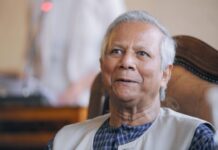Pirojpur’s Mathbarhia Razakar militia leader Abdul Jabbar, who became a member of Parliament in independent Bangladesh, will spend the rest of life behind bars for his war crimes, a special court has ruled.
Bangladesh’s first war crimes tribunal delivered the verdict on Tuesday on the war crimes case against absconding former Jatiya Party MP.
The prosecution proved all the five charges brought against Jabbar beyond doubt, the three-member tribunal said.
The verdict detailed how the former Muslim League leader collaborated with the Pakistan occupation army and carried out murders, genocide, loot, arson, forced Hindus to convert to Islam and forced many of them to leave the country from Mathbarhia during the Liberation War.
About three million people were killed and 10 million took refuge in India during the nine-month war against Pakistan in 1971.
Jabbar’s verdict is the fourth to be delivered in absentia.
Headed by Justice M Enayetur Rahim, the three-member tribunal said they were sentencing Jabbar to life in prison taking his age into consideration.
The convict, believed to be an octogenarian, is currently living in the US, according to the tribunal’s investigation arm.
He can challenge the verdict within a month but, for that, he will have to surrender first.
Charges against Jabbar
* Killing two freedom fighters at Mathbarhia’s Phuljhuri during the Liberation War. Torching and ransacking of over 100 houses at Nathparha and Kuluparha in Pirojpur.
* Killing a man at Phuljhuri, setting fire to 360 houses before looting them.
* Killing 11 people at Pirojpur’s Noli village, looting and setting fire to 60 houses there.
* Forced conversion of 200 Hindus at Phuljhuri.
* Detaining 37 people from Angulkata and Mathbarhia, killing 22 of them and seriously injuring others.
Who is this Jabbar?
An engineer by profession, Jabbar was elected a Member of the Provincial Assembly in the 1964 elections held under military ruler Ayub Khan’s ‘Basic Democracy ’ and contested the 1970 polls on a Muslim League ticket from Mathbarhia.
He sided with Pakistan during the Liberation War to thwart Bangalis’ struggle for independence.
The prosecution said he was the ‘ring leader’ of Razakars in the Sundarbans coastal region.
Jabbar followed in his father-in-law ‘s footsteps and joined the anti-liberation elements.
He was chairman of the Mathbarhia unit ‘Peace Committee’, formed to assist the Pakistan Army, according to prosecution document.
At a rally in 1971, he said, “There will be no place for freedom fighters and Hindus on this soil. The properties of Hindus are war booty. It is legal for Muslims to enjoy them.”
The once powerful collaborator went into hiding after independence. He resurfaced after military ruler and BNP founder Gen Ziaur Rahman rehabilitated anti-liberation forces and allowed them to join Bangladesh’s politics.
Martyr Binod Bihari Biswas’ son Jogyesh Biswas filed a case against him in 1972 but it got buried in the changed political scenario following the assassination of Bangabandhu Sheikh Mujibur Rahman.
In 1986, he joined another military strongman HM Ershad’s Jatiya Party and was elected an MP from Pirojpur-4 constituency. He was re-elected two years later in a sham election.
Jabbar was accused in cases for embezzling tin and rice in 1991 when the BNP came to power after Ershad’s fall.
He joined the BNP to save his skin before returning to the Jatiya Party in 2001. Jabbar was made the party’s vice chairman.
His name has been included in a list of 50 war criminals published by the Sector Commanders Forum, a platform of 1971 war veterans, who led different sectors.
Source: Bd news24










